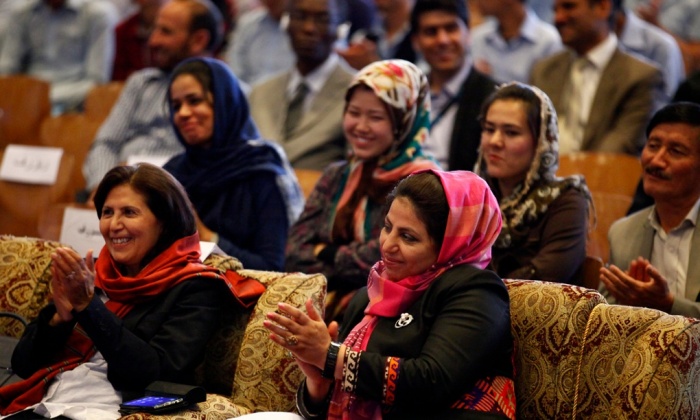|
Afghan men urged to support HeForShe campaign at Kabul launch

The Guardian Newspaper
In Kabul on Tuesday a group of Afghan men took the very rare step of calling on their male compatriots to take a stand for women’s rights.
They made their appeal at the Afghanistan launch of HeForShe, a UN campaign for gender equality known worldwide thanks partly to the actor Emma Watson.
“A Brave Man Stands for Women” was the slogan emblazoned on a banner in the hall of a Kabul high school where activists and foreign dignitaries of both genders gathered for the occasion.
The organisers are aiming to enlist manliness and valour in pursuit of the cause, perhaps recognising that gender equality is a hard sell in a male-dominated society shaped by decades of war.
“This male bravery that has been created, we should use that to defend women’s rights,” one motivational speaker, Zia Mobalegh, said from the stage. “Men of Afghanistan should be courageous enough to create gender equality.”
The campaign signals a change in approach from international donors. Since 2001, gender equality has been a pillar of western aid in Afghanistan, but it almost exclusively targeted women.
“A lot of the problems that women face in this country arise from how we men look at society,” Barry Salaam, a prominent activist, said. He was made aware of Afghanistan’s gender gap at the age of 12 when his sister was discriminated against at school. “Looking at her, I always felt guilty,” he said. “Unless we men change ourselves and the way we view women, we won’t be able to bring fundamental changes.”
The UN plans to roll out the campaign in five other provinces as well as Kabul: Balkh, Herat, Bamiyan, Nangarhar and Kandahar. But the farther away from the conference halls of the capital, the stauncher the opposition to disruption of the social order.
“These things are really sensitive for men here,” said Ramin Anwari, an activist and former journalist. He said many men fear that emancipation of women will cost them their own privileges.
“Women’s rights have been framed as absolute freedom for women, which Afghanistan is not ready for. There is a big need to reframe the struggle so it’s not offensive to the men that have dominated society throughout history.”
This is a problem of men that should be solved by men. Women are just the victims.
Ameer Mohammad Dareenori, a tribal elder from Nangarhar, was not worried about losing privileges, and fully supported gender equality in the legal system and the workplace, he said, chastising the few attending parliamentarians for leaving the launch early. “That’s a disgrace,” he said.
Dareenori, however, stressed that equality must be contingent on the word of Islamic scriptures, including laws stipulating that a woman’s testimony is worth half of a man’s, as well as family and marital laws allowing men to take four wives, to provide for them. A woman should not have the same right, he said, as more than one husband would create confusion about who was the father of her children.
If equality has eluded Afghan women during the past 14 years, it is not for lack of money. As late as October last year, the US launched its largest gender awareness programme, Promote. The US international development agency, USAid, has committed $216m (£137m) to the programme, while other donors are expected to contribute an extra $200m. The programme, has been criticised, however, for not consulting the Afghan women it is meant to support.
Lack of consultation has been a problem, said some activists, who see promising signs that foreign donors will now give Afghan organisations more autonomy. Telling Afghans what to do “has created a lot of backlash”, said Mariam Safi, executive director of Drops, a civil society organisation.
“Finally, the international community is looking into implementing local ownership,” she said. “That gives local organisations space to implement programs with relation to women’s rights.”
Since taking office in September, the government of president Ashraf Ghani has taken a few strides to improve female representation in the political and legal system. His wife, Rula Ghani, has assumed a more public role than any other Afghan first lady of the past 50 years.
After appointing four female ministers in April, Ghani on Sunday named the first female judge, Anisa Rassouli, to the supreme court.
That is “tangible proof”, said Elzira Sagynbaeva, the representative of UN Women in Afghanistan, that “the unity government is committed to tackling the issues faced by women and girls in Afghanistan”.
Asked whether western gender campaigns should have targeted men earlier, Sagynbaeva said: “It’s a very good point … The last 10 years were all about women fighting for women.”
HeForShe seeks to motivate local students, elders and religious teachers to create awareness in communities. Real improvement requires deep institutional and cultural changes.
Kabul is still reeling from an incident three months ago when Farkhunda, a 27-year-old-woman, was viciously beaten to death by a mob. The incident sparked the largest protests for women’s rights in recent memory, and became a symbol of discrimination of women and their lack of legal protection. To Salaam, the activist, HeForShe finally puts the onus on men in a country where women are often seen as instigators of conflict, even when they are beaten, raped or escape abuse.
“That mindset has to change, and it comes from men. It’s a problem of men that should be solved by men. Women are just the victims,” he said.
|
Guardian Newspaper, 18/06/2015
|
|
|
|
The Mary Initiative
A Bridge of Understanding
Operational, Safety, Security & First Aid Training for NGO's
|
|
|
|